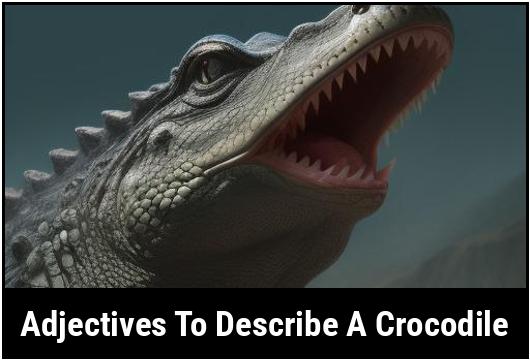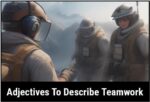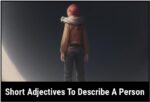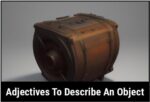- You are here:
- Home »
- adjectives
- » 41 Adjectives To Describe A Crocodile

41 Adjectives To Describe A Crocodile
Crocodiles are fascinating creatures that have captivated human fascination for centuries. These ancient predators have a fearsome reputation, and their appearance and behavior evoke a wide range of emotions and reactions. Using adjectives to describe crocodiles can help to capture the complex nature of these creatures and convey their characteristics effectively. In this comprehensive guide, we will explore various adjectives that can be used to describe crocodiles, why it is important to use adjectives in such descriptions, and how to choose the right adjectives for an accurate portrayal.
Key Takeaways
- Adjectives play a crucial role in painting a vivid and accurate picture of crocodiles by highlighting their specific attributes and characteristics.
- Choosing the right adjectives is essential to convey the diverse aspects of a crocodile’s nature, from their physical appearance to their behavior and demeanor.
- Various types of adjectives can be used to describe crocodiles, including those related to their appearance, behavior, habitat, and evolutionary traits.
Adjectives To Describe A Crocodile
1. Ferocious
Meaning: Showing extreme aggression or fierceness.
Example: The crocodile’s ferocious jaws snapped shut with terrifying force, its primal instinct to conquer its prey evident.
2. Ancient
Meaning: Existing for a very long time; prehistoric.
Example: The ancient crocodile species dates back millions of years, a testament to its astonishing evolutionary adaptability.
3. Stealthy
Meaning: Moving in a secretive and inconspicuous manner.
Example: The crocodile glided through the water, its stealthy approach catching the unwary gazelle by surprise.
4. Formidable
Meaning: Inspiring fear or respect due to impressive size, power, or capability.
Example: The crocodile’s formidable armored hide ensured it was virtually impervious to all but the strongest attacks.
5. Patient
Meaning: Capable of waiting calmly for a considerable period of time.
Example: The patient crocodile remained submerged, watching the riverbank for the perfect moment to strike.
6. Territorial
Meaning: Defending and marking an area as its own.
Example: Crocodiles are highly territorial creatures, and any intruders who encroach upon their domain risk a violent confrontation.
7. Aquatic
Meaning: Adapted for living in water.
Example: With its streamlined body and powerful tail, the crocodile is perfectly designed for its aquatic lifestyle.
8. Prehistoric
Meaning: Relating to a time before recorded history.
Example: The discovery of fossilized crocodile remains allowed scientists to gain invaluable insights into the prehistoric world.
9. Camouflaged
Meaning: Concealed or disguised for protection or deception.
Example: The crocodile’s camouflaged skin made it nearly invisible in the murky waters, enabling successful ambushes.
10. Fearless
Meaning: Exhibiting no fear; bold and courageous.
Example: The fearless crocodile fearlessly confronted any creature that dared challenge its dominance.
11. Primeval
Meaning: Resembling or characteristic of an early stage in evolutionary development.
Example: As the crocodile emerged from the swamp, it evoked a primeval sense of awe within those who observed it.
12. Scaly
Meaning: Covered in or consisting of scales.
Example: The crocodile’s scaly skin provided an effective barrier against external threats and helped retain moisture.
13. Powerful
Meaning: Possessing great strength or force.
Example: With its massive jaw muscles, the crocodile could exert a powerful bite, easily overpowering its prey.
14. Ruthless
Meaning: Showing no compassion or mercy; merciless.
Example: The ruthless crocodile lurked in the water, ready to launch a surprise attack on any unsuspecting prey.
15. Resilient
Meaning: Able to recover quickly from difficult conditions.
Example: The crocodile’s resilient nature allowed it to survive in diverse habitats, from swamps to arid riverbanks.
16. Solitary
Meaning: Preferring to live alone or in isolation.
Example: Crocodiles are known for being solitary animals, coming together only during mating or territorial disputes.
17. Majestic
Meaning: Grand, impressive, or dignified in appearance or manner.
Example: The crocodile basked in the sun, its majestic aura captivating all who observed its regal presence.
18. Impenetrable
Meaning: Impossible to pass through or enter.
Example: The crocodile’s thick scales acted as an impenetrable barrier, protecting it from most potential threats.
19. Cold-blooded
Meaning: Lacking the ability to regulate body temperature internally; relying on external sources.
Example: As a cold-blooded reptile, the crocodile relies on basking in the sun to warm its body and increase its activity.
20. Agile
Meaning: Able to move quickly and easily with coordination and grace.
Example: Despite their large size, crocodiles display surprising agility when lunging out of the water to catch prey.
21. Stealthy
Meaning: Moving in a secretive and inconspicuous manner.
Example: The crocodile glided through the water, its stealthy approach catching the unwary gazelle by surprise.
22. Formidable
Meaning: Inspiring fear or respect due to impressive size, power, or capability.
Example: The crocodile’s formidable armored hide ensured it was virtually impervious to all but the strongest attacks.
23. Patient
Meaning: Capable of waiting calmly for a considerable period of time.
Example: The patient crocodile remained submerged, watching the riverbank for the perfect moment to strike.
24. Territorial
Meaning: Defending and marking an area as its own.
Example: Crocodiles are highly territorial creatures, and any intruders who encroach upon their domain risk a violent confrontation.
25. Aquatic
Meaning: Adapted for living in water.
Example: With its streamlined body and powerful tail, the crocodile is perfectly designed for its aquatic lifestyle.
26. Prehistoric
Meaning: Relating to a time before recorded history.
Example: The discovery of fossilized crocodile remains allowed scientists to gain invaluable insights into the prehistoric world.
27. Camouflaged
Meaning: Concealed or disguised for protection or deception.
Example: The crocodile’s camouflaged skin made it nearly invisible in the murky waters, enabling successful ambushes.
28. Fearless
Meaning: Exhibiting no fear; bold and courageous.
Example: The fearless crocodile fearlessly confronted any creature that dared challenge its dominance.
29. Primeval
Meaning: Resembling or characteristic of an early stage in evolutionary development.
Example: As the crocodile emerged from the swamp, it evoked a primeval sense of awe within those who observed it.
30. Scaly
Meaning: Covered in or consisting of scales.
Example: The crocodile’s scaly skin provided an effective barrier against external threats and helped retain moisture.
31. Powerful
Meaning: Possessing great strength or force.
Example: With its massive jaw muscles, the crocodile could exert a powerful bite, easily overpowering its prey.
32. Ruthless
Meaning: Showing no compassion or mercy; merciless.
Example: The ruthless crocodile lurked in the water, ready to launch a surprise attack on any unsuspecting prey.
33. Resilient
Meaning: Able to recover quickly from difficult conditions.
Example: The crocodile’s resilient nature allowed it to survive in diverse habitats, from swamps to arid riverbanks.
34. Solitary
Meaning: Preferring to live alone or in isolation.
Example: Crocodiles are known for being solitary animals, coming together only during mating or territorial disputes.
35. Majestic
Meaning: Grand, impressive, or dignified in appearance or manner.
Example: The crocodile basked in the sun, its majestic aura captivating all who observed its regal presence.
36. Impenetrable
Meaning: Impossible to pass through or enter.
Example: The crocodile’s thick scales acted as an impenetrable barrier, protecting it from most potential threats.
37. Cold-blooded
Meaning: Lacking the ability to regulate body temperature internally; relying on external sources.
Example: As a cold-blooded reptile, the crocodile relies on basking in the sun to warm its body and increase its activity.
38. Agile
Meaning: Able to move quickly and easily with coordination and grace.
Example: Despite their large size, crocodiles display surprising agility when lunging out of the water to catch prey.
39. Stealthy
Meaning: Moving in a secretive and inconspicuous manner.
Example: The crocodile glided through the water, its stealthy approach catching the unwary gazelle by surprise.
40. Formidable
Meaning: Inspiring fear or respect due to impressive size, power, or capability.
Example: The crocodile’s formidable armored hide ensured it was virtually impervious to all but the strongest attacks.
41. Patient
Meaning: Capable of waiting calmly for a considerable period of time.
Example: The patient crocodile remained submerged, watching the riverbank for the perfect moment to strike.
The crocodile – a ferocious, ancient, and stealthy creature – possesses a myriad of adjectives that encapsulate its significance and meaning. From its formidable nature to its patient hunting strategy, the crocodile exemplifies an impressive balance of power and grace. Through this comprehensive list, one can begin to appreciate the magnificent qualities that make the crocodile a truly remarkable and captivating creature in our natural world.
Why Use Adjectives To Describe Crocodile
Using adjectives to describe crocodiles serves multiple important purposes. Firstly, adjectives allow us to convey the unique and distinctive features of these creatures in a more nuanced and descriptive manner. By employing adjectives, we can capture the essence of a crocodile’s appearance, behavior, and personality, thus enabling a more vivid and immersive portrayal.
Furthermore, adjectives can evoke specific emotions and reactions in the reader or listener, thereby enhancing the impact and effectiveness of the description. Whether it is to evoke a sense of awe and respect for the crocodile’s power, or to instill caution and wariness due to its predatory nature, adjectives enable us to shape the audience’s perception and understanding of these formidable reptiles.
In educational or informative contexts, using adjectives to describe crocodiles can aid in the dissemination of accurate knowledge and understanding. By employing precise adjectives, educators and researchers can convey detailed information about crocodile species, their adaptations, and their ecological significance.
How To Choose The Right Adjective To Describe Crocodile
When choosing adjectives to describe crocodiles, it is essential to consider several factors to ensure an accurate and effective portrayal. Firstly, one must assess the specific aspect of the crocodile that they aim to describe. Whether it’s the physical appearance, behavior, habitat, or evolutionary traits, selecting adjectives that align with the targeted attributes is crucial.
Another important consideration is to select adjectives that capture the inherent characteristics and nature of crocodiles. These creatures are known for their formidable strength, stealthy movements, and ancient lineage. Adjectives that reflect these features help in creating a more authentic and complete depiction.
In addition, it is essential to gauge the intended impact of the description. Whether the goal is to evoke awe, fear, admiration, or fascination, the chosen adjectives should be tailored to elicit the desired emotional response in the audience.
Types Of Adjectives For Describing Crocodile
Physical Appearance
When describing the physical appearance of crocodiles, a diverse range of adjectives can be employed to capture their formidable and awe-inspiring traits. Some examples include:
- Formidable: Describing the imposing and powerful presence of crocodiles.
- Sleek: Conveying the streamlined and agile physique of these creatures.
- Formidable: Reflecting the robust and resilient nature of crocodiles.
Behavior And Demeanor
Crocodiles exhibit a wide array of behaviors and demeanors, and using adjectives to describe these aspects can enhance the understanding of their nature. Consider the following adjectives:
- Stealthy: Portraying the secretive and cunning nature of crocodiles when stalking prey.
- Patient: Highlighting the remarkable patience displayed by crocodiles while hunting or waiting for opportunities.
- Territorial: Emphasizing the fiercely territorial behavior exhibited by crocodiles in defending their habitats.
Habitat And Ecology
Adjectives related to the habitat and ecological role of crocodiles contribute to a comprehensive portrayal of these reptiles. Examples include:
- Aquatic: Describing the strong association of crocodiles with water environments.
- Semiaquatic: Conveying the adaptability of crocodiles to both aquatic and terrestrial habitats.
- Ecosystem: Emphasizing the integral role of crocodiles in their respective ecosystems.
Evolutionary Traits
Adjectives related to the evolutionary traits of crocodiles shed light on their ancient lineage and unique biological features. Examples include:
- Prehistoric: Reflecting the ancient origins and unchanged evolutionary traits of crocodiles.
- Resilient: Emphasizing the remarkable resilience of crocodiles as a species over millions of years.
- Apex: Conveying the status of crocodiles as apex predators in their respective ecosystems.
Using adjectives to describe crocodiles is an essential tool to convey their multifaceted nature and to evoke specific emotions and reactions in the audience. By carefully choosing adjectives that align with the intended portrayal and impact, one can create vivid and immersive descriptions of these remarkable reptiles. Adjectives related to their physical appearance, behavior and demeanor, habitat and ecology, and evolutionary traits all contribute to a comprehensive and informative depiction of crocodiles. Whether it is to communicate their awe-inspiring presence, intricate behaviors, or ecological importance, adjectives play a pivotal role in capturing the essence of these ancient predators.
Examples Of Adjectives For Different Types Of Crocodile
Crocodiles are fascinating creatures that have captured the imagination of humans for centuries. Known for their powerful jaws, scaly skin, and stealthy movements in water, crocodiles are often associated with strength, danger, and the wild. When it comes to describing these ancient reptiles, choosing the right adjectives can add depth and vividness to your writing or conversation.
-
Fierce: Crocodiles are known for their aggressive nature and powerful jaws. Using the adjective "fierce" can capture their intimidating and dangerous disposition. For example, "The fierce crocodile lurked in the water, ready to strike."
-
Powerful: Crocodiles are among the strongest predators in the animal kingdom. Describing them as "powerful" highlights their physical strength and ability to overpower their prey. For example, "The powerful crocodile effortlessly dragged its prey into the water."
-
Ancient: Crocodiles have existed for millions of years, and their lineage can be traced back to the age of dinosaurs. The adjective "ancient" emphasizes their long history and primal nature. For example, "The ancient crocodile basked in the sun, a living relic from the past."
-
Sleek: Crocodiles have a streamlined body shape that allows them to move swiftly through water. Describing them as "sleek" brings attention to their agility and grace. For example, "The sleek crocodile glided through the water, leaving ripples in its wake."
-
Menacing: With their sharp teeth and cold, calculating eyes, crocodiles have a menacing appearance. Using the adjective "menacing" conveys the sense of danger and fear associated with these reptiles. For example, "The menacing crocodile slowly approached its prey, sending shivers down its spine."
-
Camouflaged: Crocodiles have the ability to perfectly blend into their surroundings, thanks to their scaly skin that acts as excellent camouflage. Describing them as "camouflaged" emphasizes their ability to remain hidden until the perfect moment to strike. For example, "The camouflaged crocodile lay concealed in the murky water, silently waiting for its next meal."
-
Formidable: Crocodiles are formidable predators that inspire awe and respect. Using the adjective "formidable" highlights their menacing presence and dominance in their ecosystem. For example, "The formidable crocodile ruled over its territory, keeping all other creatures at bay."
-
Prehistoric: Crocodiles have a primitive appearance that has remained largely unchanged over millions of years. Describing them as "prehistoric" evokes a sense of timelessness and connects them to their ancient origins. For example, "The prehistoric crocodile emerged from the depths of the river, reminding us of the Earth’s primeval past."
-
Patient: Crocodiles are known for their patience when hunting for prey. Using the adjective "patient" highlights their ability to wait for the perfect opportunity to strike. For example, "The patient crocodile lay motionless by the riverbank, its eyes fixated on its unsuspecting prey."
-
Territorial: Crocodiles have a strong sense of territory and fiercely defend their nesting sites and hunting grounds. Describing them as "territorial" emphasizes their protective nature. For example, "The territorial crocodile snarled and lunged at any intruders that approached its nesting site."
Common Mistakes In Using Adjectives To Describe Crocodile
When using adjectives to describe crocodiles, it is important to be accurate and specific. Here are some common mistakes to avoid:
-
Using irrelevant adjectives: Make sure that the adjectives you use accurately describe the crocodile and its characteristics. Avoid using adjectives that are completely unrelated or do not enhance the description. For example, describing a crocodile as "funny" or "adorable" would not accurately reflect its nature.
-
Overusing generic adjectives: While adjectives like "big" or "strong" can sometimes be used to describe crocodiles, it is important to use a range of more specific adjectives to provide a more vivid and detailed description. Overusing generic adjectives can make your writing dull and repetitive.
-
Using adjectives without context: Adjectives should provide context and give the reader a clear understanding of what the crocodile is like. Avoid using adjectives in isolation without providing any supporting information or context. For example, simply describing a crocodile as "dangerous" without any further details may not create a strong visual image.
-
Neglecting sensory adjectives: To create a more immersive and engaging description, incorporate sensory adjectives that appeal to the reader’s senses. Describing the texture of the crocodile’s skin, the sound of its hiss, or the smell of its habitat can create a more vivid and memorable image.
Using Adjectives Effectively
To use adjectives effectively when describing crocodiles, consider the following tips:
-
Be specific: Use a variety of adjectives to paint a detailed picture of the crocodile. Incorporate adjectives that describe its appearance, behavior, and habitat. This will help create a more comprehensive description and capture the essence of the animal.
-
Show, don’t tell: Rather than simply stating an adjective, try to show the reader what the crocodile is like through descriptive language and examples. Instead of saying a crocodile is "aggressive," describe its snapping jaws, its menacing stare, and its swift movements in the water.
-
Use comparisons and metaphors: Comparisons and metaphors can bring your description to life and make it more engaging. For example, you can compare a crocodile’s scaly skin to armor or describe its eyes as cold as ice. These literary devices can add depth and richness to your writing.
-
Consider the context: Adjectives should be chosen based on the context in which the crocodile is being described. Is it in its natural habitat? Is it basking in the sun or hunting for prey? Tailor your adjectives to fit the specific situation, and consider how they contribute to the overall image you want to create.
-
Mix positive and negative adjectives: Using a combination of positive and negative adjectives can create a more balanced and realistic description. This can help avoid painting an overly positive or negative portrayal of the crocodile and make your writing more nuanced.
Exercises And Practice
To further develop your skills in describing crocodiles using adjectives, here are some exercises and practice activities:
-
Descriptive writing: Write a short paragraph or essay describing a crocodile using a variety of adjectives. Focus on incorporating sensory details and vivid language to bring the image to life.
-
Adjective brainstorming: Challenge yourself to come up with as many adjectives as you can to describe a crocodile. Write them down and categorize them based on their characteristics, such as appearance, behavior, or habitat.
-
Adjective substitution: Take a piece of writing that includes a description of a crocodile and replace some of the adjectives with different ones. Assess how the new adjectives change the overall tone and imagery.
Conclusion
Describing crocodiles using powerful, evocative, and accurate adjectives can enhance your writing and create a vivid picture in the reader’s mind. By choosing adjectives that capture their physical attributes, behavior, and unique characteristics, you can effectively convey the awe-inspiring nature of these ancient reptiles. Remember to be specific, show rather than tell, consider the context, and use a combination of positive and negative adjectives to create a well-rounded and engaging description. With practice, you can master the art of using adjectives to paint a detailed and compelling picture of crocodiles.
FAQS On Adjectives To Describe A Crocodile
What Are Some Common Adjectives Used To Describe A Crocodile?
Ferocious, menacing, powerful, ancient, and stealthy are all often used to describe a crocodile.
Why Is "ferocious" An Appropriate Adjective To Describe A Crocodile?
"Ferocious" accurately captures the aggressive and predatory nature of crocodiles, which are known for their ability to take down large prey.
How Does The Adjective "menacing" Apply To A Crocodile?
Crocodiles have a very intimidating appearance, with their sharp teeth, tough scales, and intense stare. This makes "menacing" a fitting adjective to describe them.
Why Is "powerful" A Commonly Used Adjective To Describe Crocodiles?
Crocodiles are one of the most physically powerful animals on land and in water. Their muscular bodies and strong jaws allow them to take down prey much larger than themselves.
How Does The Adjective "ancient" Relate To Crocodiles?
Crocodiles are one of the oldest surviving reptile species, dating back millions of years. Their primitive features and ancient lineage make "ancient" a suitable adjective to describe them.
Can You Explain Why "stealthy" Is An Appropriate Adjective For A Crocodile?
Despite their large and bulky appearance, crocodiles are incredibly agile and stealthy in the water. They can sneak up on their prey without making a sound, making "stealthy" an accurate description.








